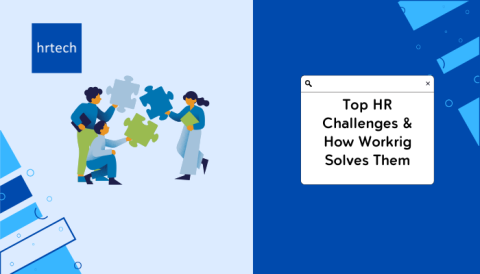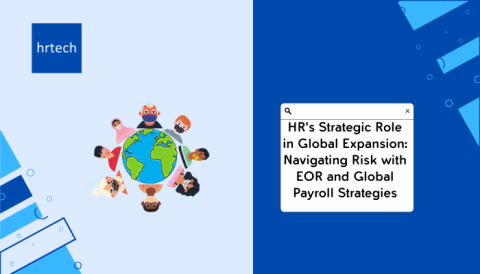Technology has had its effect on nearly every industry in the world, as well as on the various branches of business administration. The field of HR, in particular, has gone through a slew of changes at the hands of technology, most of them for the better, some of them for the worse.
In this blog post, let’s take a look at how technology is making an effect on HR and the various activities it encompasses.
Is the Effect of Technology on HR Generally Positive or Negative?
Generally, the effect of technology has been positive. It has automated various tasks, allowing HR managers to spend their time productively. It has also made a lot of tasks easier (the ones that aren’t completely automatable), such as data collection and organization.
One of the main negative effects that technology has had on HR is the elimination of jobs—ones that require manual labor. Tasks like payroll processing, employee onboarding, attendance management, etc., can be performed easily by software and digital tools. As a result, the need for actual people has narrowed.
The purpose of describing the nature of technology’s effect on HR was to set the tone for the coming parts of this article.
Impact of Technology on the Field of Human Resource Management
Now, let’s move on to look at how technology has shaped and impacted the various fields of HR.
- Technology has made recruitment a lot easier
One of the main tasks performed by the HR department is recruitment—finding and acquiring new talent for a business. The process of recruitment includes the following steps and phases:
- Publishing a job description on an online platform
- Receipt and processing of resumes
- Shortlisting of candidates based on their qualifications and experiences
…and so on.
Technology has made almost all of these steps easier and more efficient. For example,
- With digital tools and online software, you can create and optimize job descriptions to attract the right talent. (Check out our e-book for more on this topic: Building a Scalable and Efficient Talent Acquisition Strategy with Generative AI)
- You can set up a job application portal on your website (yet another example of technology) to receive and categorize incoming resumes.
- Automated software can be used to shortlist candidates based on their qualifications and experiences.
Job platforms like Indeed allow recruiters to ask applicants direct questions, such as the total number of years they have spent working in a particular field and whether or not they possess specific degrees. If the answer given to those questions is Yes, the candidate is shortlisted; otherwise, not.
Use of Technology in Job Advertisements
Online job platforms similar to the one we just mentioned are yet another example of technology in HR. You can make job postings on such platforms so that people can view them online.
Even if you advertise your job openings using physical media, such as billboards and posters, you have a way to bring a technological touch to it. You can, for example, show website links on such advertisements that people can quickly enter in their phones to view your company and the available openings.
You can also make this one step easier by creating a QR code and printing it on the ad. People can use an online QR code scanner to scan the code and visit whichever webpage it points them to.
Here is an example:
- Technology has made payroll processing quick and seamless
Moving on, payroll processing is another part of HR that technology has had a positive impact on.
Payroll processing includes the calculation of employees’ hourly pay, deductions, taxes, etc., and the finalizing of the salary/wages that they have to be given.
Technology, in the form of online tools and portals, makes this whole process easy and simple. Quickbooks is a very good example of an online platform that allows employers to quickly perform payroll. The necessary information about the employee, such as their salary, benefits, deductible tax, etc., are entered into the system. At the end of the month (or week), the total time or days attended by the employee are specified. The tool automatically calculates the net amount they have to be paid.
Another benefit of using these types of tools and platforms is that employees can easily learn about the details of their net pay, including the amount that was deducted, the amount that was withheld for taxes, and the amount that came from benefits, etc.
Without technology, the wage calculation itself would be quite a hassle. On top of that, it would be quite arduous to individually compile, store, and provide information about the wage calculation (which the employees have a right to acquire) if the need arises.
- Technology has made it easier for employees to clock in their work hours
Technology has also made it easier for employees to mark their attendance and clock in their hours.
Instead of going through a manual process every day to clock in and request leaves, breaks, etc., employees can do it all using online HR software. Employee portals, such as BambooHR, allow users to easily start their work hours, start or end their break, request off times, and do a lot of stuff that would traditionally require them to make a trip to the HR office.
Clockify is a good example of a time-clocking software
By starting and ending their work hours themselves, employees can have peace of mind. They won’t have to worry about possible instances of missed attendance, nor would they need to worry about their time being clocked in or out unfairly.
The HR department does, of course, have control over all the details, but any changes made to the same are checked and confirmed with the employee. This creates transparency in the employer-employee relationship.
- Technology has paved the way for remote and long-distance employment
One of the best perks and benefits of technology in HR is the possibility of remote and long-distance employment. Managing human resources on-site can be a challenge, especially for smaller companies and emerging businesses.
By utilizing the option of remote working, a company can utilize its human resources away from the premises. They can keep track of each employee’s performance, track their hours, and do all the normal tasks remotely.
Nowadays, there are different types of software that can be installed on work computers to record the mouse movements and keystrokes of the user. They also take periodic screenshots, which are uploaded to a database. All of this information is later used by the HR manager to analyze how productive a remote employee is.
Time Doctor is a good example of such software.
Final Words: The Future of Technology in HR
In the post above, we’ve talked about how technology has shaped and improved the field of HR for businesses.
In the future, it is expected that more and more tasks related to business administration and HR management will be taken up by technology. The ones that it is already used for will improve and reach a point of total automation based on artificial intelligence.
However, with that said, a realistic prediction for the future impact of technology on HR would also consider that the “human” element isn’t going to be completely eradicated. Although many tasks and processes will be automated and intelligently performed by software, it cannot be said that HRM would devolve completely on technology. There will always remain an essential need for actual humans to run and oversee the big machine.
We’re making this observation and prediction in particular because of the rampant (and false) idea circulating nowadays that AI will be the death of every human job. With more and more AI tools being made every day, people tend to promote the eerily dystopian idea that AI is going to steal the job of every human, except for blue-collar workers.
This isn’t exactly true. Sure, some jobs will be taken by technology, but the future is not as bleak as online rumor-mongers will have you believe.




